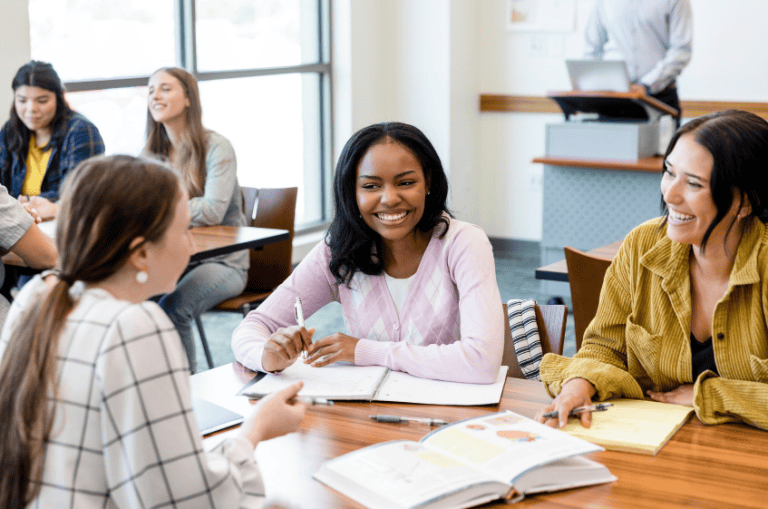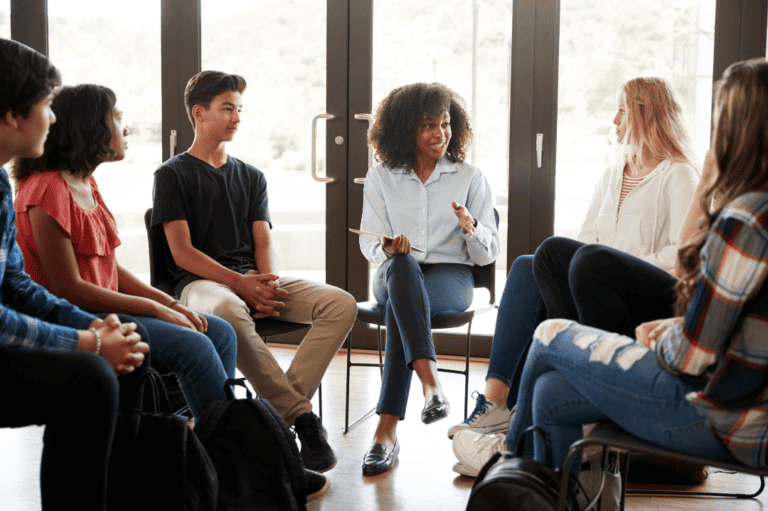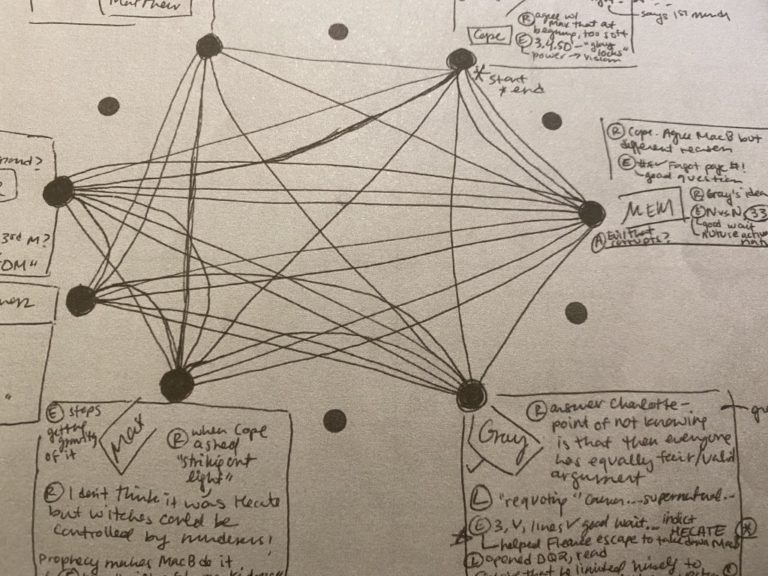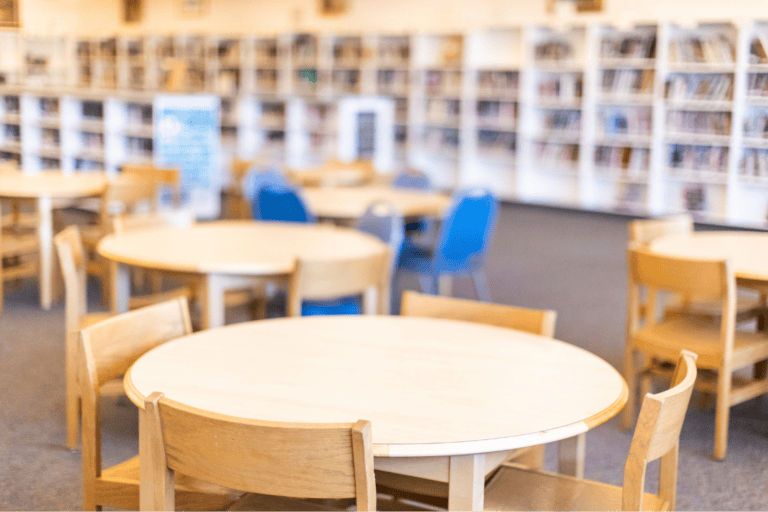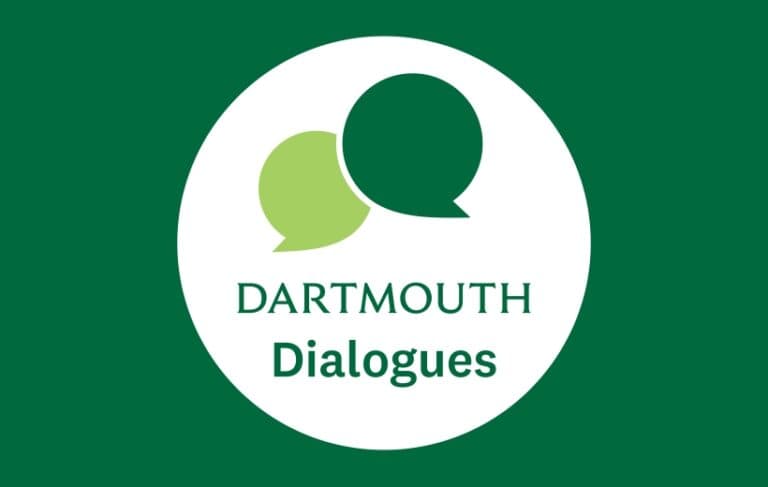Why Discussion Skills Are Daily Work: An Interview with Bridget Johnson of Deans’ RoundTable
Bridget Johnson is the founder of the Deans’ Roundtable, a professional development community for student life professionals. R.E.A.L.® Discussion Founder Liza Garonzik interviewed Bridget to hear about her journey in education, why she founded the Deans’ Roundtable, and why she thinks discussion is important for students and teachers alike.
Liza: Thanks so much for being here. Tell us about your path in education and your purpose. What’s been your true north, Bridget?

Bridget: My path is a little quirky because I never thought I would work in education. In college, I majored in international business and finance and thought I wanted to be in corporate America. Well, I got to corporate America, and I hated it. I knew that it wasn’t for me almost instantly. I was an athlete in college, and I was still pursuing that after college, and my coach shared that a school needed a part-time coach for track.
I thought to myself, well, I don’t love kids but I should try this out, and I absolutely loved it, especially working with students. After a while, they offered me a full-time job as a registrar, then eventually I moved into admissions, which I was so excited about because I love to travel. I got to learn so much about boarding schools in that period of time in my life, made so many friends, and traveled the world. I didn’t know that boarding school was an option when I was in high school, so traveling and sharing with students about boarding schools and helping them think about their education options was extremely rewarding.
I went from living on campus and working in the admissions office to being a Dean of Students. I loved it so much, but at first it was extremely hard work. I had come from admissions and really did not have any experience in discipline, and I didn’t know what I didn’t know, so it was a really big transition both professionally and mindset wise.
What I realized through that process is that there needed to be some support and professional development for deans, and that’s how the Deans’ Roundtable was created.
I created it with two other folks who were deans at the time, and we began running it in 2012. And, in my opinion: there is still not enough professional development out there for deans! I love the connection and relationship building that happens within Deans’ Roundtable. When you talk about a North Star, that would be mine – connecting people and providing support so that deans can foster a safe and supportive environment and community for kids.
Liza: Wow – what a story, Bridget! You have held so many different kinds of roles in schools – from your perspective, what is the role that discussion plays in school life?
Bridget: It is so important for many different reasons. First, when you have people coming from all different backgrounds, all different schools, especially in the boarding school environment, the importance of discussion extends far beyond academics. If you’re a ninth grader who’s come from a background that doesn’t exercise the discussion muscle, or you’re a student that is not comfortable speaking up in class, learning discussion skills is so important and so helpful. These discussion skills are the groundwork for knowing how to have a conversation with each other, how to advocate for themselves, and how to make friends. Discussion skills are life skills.
These discussion skills are the groundwork for knowing how to have a conversation with each other, how to advocate for themselves, and how to make friends. Discussion skills are life skills.
Bridget Johnson
Liza: I appreciate your empathy with the student experience, and I can tell you’ve spent a lot of time with kids. My guess is that as a dean, you’ve had to have a lot of difficult discussions. Do you have tips or strategies that you use for managing those hard conversations?
Bridget:One thing I’ve learned is that you can write out what you will say. If it is a really important conversation, one that you haven’t had before, find someone you can role-play with to practice saying the words out loud first.The other thing is making sure to breathe and take intentional pauses. I’ve learned that you don’t have to jump into the conversation full speed ahead. If you say something, and feel that it is not quite what you meant to say, say that, and start over from the beginning of your point. I think sometimes we feel the pressure to be perfect in these moments, especially during difficult conversations and that is just not realistic. The other thing I’ve learned is to try to take the emotion out of conversations and deal just with the facts. That doesn’t mean you’re devoid of emotion, of course we are not robots, but there is a time and place for emotions and I think in difficult conversations it is important to keep your emotions at an even keel. If you are the person delivering the “difficult” information, you are also the manager of the conversation and in that role, you need to check your own emotions.
If you are the person delivering the “difficult” information, you are also the manager of the conversation and in that role, you need to check your own emotions.
bridget johnson
Liza: What I really appreciated about all of those like a common thread connecting all of those comments is self-awareness. It’s similar to what we teach students in the classroom with R.E.A.L. We give students sentence stems for moments of disagreement or moments when they feel challenged! At R.E.A.L, we think a lot about how the world is in a “conversation crisis” right now. What challenges do you see specifically when it comes to school and conversations? What challenges do students and faculty face when it comes to discussion?
Bridget: We’re in this era where people are so comfortable saying things behind the screen, but when it comes to actually having real conversations face to face, we are struggling. It’s uncomfortable because we don’t do it enough, and students especially don’t have good role models right now in terms of what kindness in discussion looks like, or what civil discourse looks like. Trying to reign all of that in on school campuses is really tricky, especially when we haven’t taken the time to talk honestly about where we are in terms of discussion in our community, or have school norms around discussion. Schools need to say “this is how we treat each other” and “this is how we interact with each other” on a daily basis, you can’t just do it at the beginning of the school year, or when a difficult conversation happens! If you don’t, then you can’t get upset with kids who navigate hard conversations poorly – or, worse, avoid them in-person and handle everything via text or groupchat!
Schools need to say “this is how we treat each other” and “this is how we interact with each other” on a daily basis, you can’t just do it at the beginning of the school year, or when a difficult conversation happens!
bridget johnson
Liza: Agree! When you think about the mechanics of culture on campus, how we treat each other in conversation is the bedrock of the culture. So amidst this conversation crisis, it feels so critical in schools to be providing guardrails for students in how to talk with one another, and providing guidance around communication norms that are intergenerational. There are no models in the external world, so it’s up to schools to define how we communicate on campus.
Tell us about the current work and mission of Deans’ Roundtable
Bridget: As I said, we really felt like there was a void of professional development for Deans of Students in particular. Deans’ Roundtable gets deans together to talk about hot topics, to commiserate, to network, and most importantly to provide a support system for each other. We think about it as a group that you can call to say “Have you ever had this happen?” “How are you putting this in your handbook?” “What policy are you doing for this?”
There was a strong reception and a vibrant community, so we’ve expanded, which is exciting. Now, we have a weekly blog, a new podcast series, and an online platform for what we call Student Life professionals. Our community has grown to include class deans, directors of residential life, directors of student life, and all these other folks who work outside the classroom and have important interactions with students. We are also launching a new Student Life Assessment tool for schools which will allow school to get real data on what’s happening outside of the classroom on their campuses!
Liza: Thank you for sharing all of that! It is very clear to me that you began this work by listening to what folks needed and you are passionate about the work you all do. Thank you, Bridget, for being with us today. We’re so lucky to be discussing with you.
Bridget: I am so honored to be here, and thanks so much for having me.
For more on the Deans’ Roundtable you can check out their website here, email Bridget at bridget@deansroundtable.org, and learn more about their conference this summer here.

